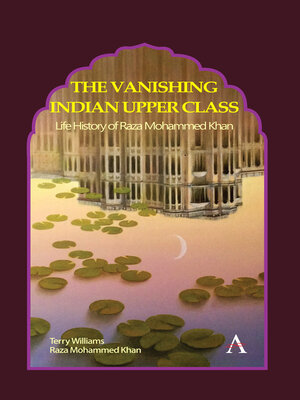The Vanishing Indian Upper Class
ebook ∣ Life History of Raza Mohammed Khan · Anthem Studies in South Asian Literature, Aesthetics and Culture
By Terry Williams

Sign up to save your library
With an OverDrive account, you can save your favorite libraries for at-a-glance information about availability. Find out more about OverDrive accounts.
Find this title in Libby, the library reading app by OverDrive.



Search for a digital library with this title
Title found at these libraries:
| Library Name | Distance |
|---|---|
| Loading... |
This book itemize the familial, cultural, religious, and historical themes in a unique life story. The book is distinctive in that it continues the life story as a sociological genre, and as a methodological construct [it] attempts the comprehensive life story which engages the totality of a person's life by capturing the essence and the development of a peerless human being. Though there are questions whether it is possible to arrange the totality of a life, an important part of the legacy at the moment comes in various forms, including biographies, video diaries, autobiographies, home web pages, and journals, but I realize all life stories are constructed and partial, yet, the attempt here is to tell a story of a member of the ruling elite rarely told. This book is part of a series about cosmopolitan life and no better way to serve that purpose than to use the life story as part of that tradition.
|The Vanishing Indian Upper Class is a story necessary to the life, the times and the action as told and provides a basic narrative tension by what I refer to as an ethnographic excavation, because it begins to answer the basic question of how the story extend beyond the life history of one person. Sociologist Howard Becker considering the situation of the life history document in sociology stressed the "importance of presenting the actors subjective situation of the person's experiences and on "giving context in which he undergoes his social experiences." Becker recognized life history data as an important source for theory and a "means of testing concepts." In this way life history data seen as material offering basic evidence about social interaction and process because it "offers a vivid telling of what it means to be a certain kind of person."
This book concerns issues of gender, the role of women, inheritance, male privilege, ruling elites, marriage, the caste system, poverty, greed and familial betrayal.The idea of betrayal-one of the central tenets of the human condition-is much on display in this text. At the core of the book is a fundamental question: to what extent does the chicanery involving a family inheritance tell a much larger story about modern Indian culture from the perspective of an Indian Muslim and the nation as a whole.
The story is about the family of Raza Muhammad Khan and its legacy of honor, compassion, love, sacrifice, betrayal and dividing up land. This is an engaging family history intertwined with the story of one person's life and memories. As interlocutor I know a true-life history involves more than conversations and the material here provides other forms of personal documentations: letters, e-mails, photographs, illustrations, notes, poems, stories and accounts written by different family members, limited life histories, autobiographical accounts, and court records all as a source of knowledge. Oscar Lewis related similar sentiments when he wrote about The Sanchez Family in Mexico and sociologists William Thomas and Florian Znaniecki's did the same in The Polish Peasant in Europe and America.
The most important early life history documents in sociology William Thomas and Florian Znaniecski. (1918). The Polish Peasant in Europe and America. University of Chicago, which was part of the early Chicago School tradition. Psychologist Gordon Allport argued that of the three main forms of life history writing: the comprehensive; the topical; the edited, with the former being the most difficult to pull off. And there are many studies of significance purported to be life histories. Clifford Shaw. (1930). The Jack Roller. University of Chicago Press; Edwin Sutherland. (1937) The Professional Thief. University of Chicago...







